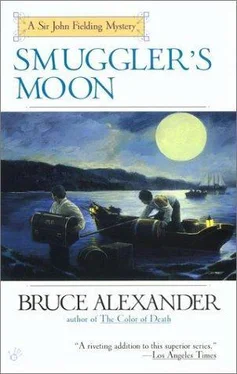Bruce Alexander - Smuggler's Moon
Здесь есть возможность читать онлайн «Bruce Alexander - Smuggler's Moon» весь текст электронной книги совершенно бесплатно (целиком полную версию без сокращений). В некоторых случаях можно слушать аудио, скачать через торрент в формате fb2 и присутствует краткое содержание. Жанр: Исторический детектив, на английском языке. Описание произведения, (предисловие) а так же отзывы посетителей доступны на портале библиотеки ЛибКат.
- Название:Smuggler's Moon
- Автор:
- Жанр:
- Год:неизвестен
- ISBN:нет данных
- Рейтинг книги:4 / 5. Голосов: 1
-
Избранное:Добавить в избранное
- Отзывы:
-
Ваша оценка:
- 80
- 1
- 2
- 3
- 4
- 5
Smuggler's Moon: краткое содержание, описание и аннотация
Предлагаем к чтению аннотацию, описание, краткое содержание или предисловие (зависит от того, что написал сам автор книги «Smuggler's Moon»). Если вы не нашли необходимую информацию о книге — напишите в комментариях, мы постараемся отыскать её.
Smuggler's Moon — читать онлайн бесплатно полную книгу (весь текст) целиком
Ниже представлен текст книги, разбитый по страницам. Система сохранения места последней прочитанной страницы, позволяет с удобством читать онлайн бесплатно книгу «Smuggler's Moon», без необходимости каждый раз заново искать на чём Вы остановились. Поставьте закладку, и сможете в любой момент перейти на страницу, на которой закончили чтение.
Интервал:
Закладка:
“But how can you be so sure that Sir Simon killed this fellow-what was his name? — Sarton, yes, Sarton. How do you know that?”
“I didn’t say he pulled the trigger. I said he ordered Mr. Sarton killed.”
“There! You see? He wasn’t actually the direct cause of his death, was he? Perhaps there was some misunderstanding between Sir Simon and the fellow who actually did the deed. Perhaps he said, ‘Oh, I wish that man were dead,’ meaning it in a figurative way-not literally dead , you understand. And taking that as an order, the killer went out and shot the man dead. It could have happened just so-now, couldn’t it?”
“Hardly. Sir Simon was present at the scene. He was literally but a few feet away when the magistrate was shot down. He could have stopped it with a word.”
“But how do you know that?”
“I know that because I have a witness .”
Lord Mansfield had begun roaring the moment Sir John appeared before him. He was louder and more unbridled in his anger than I had ever seen him before-or for that matter, since. For his part, Sir John responded with remarkable restraint, knowing that if he were to speak as he was spoken to, then the interview would have collapsed into an intemperate duel of shouting and stomping.
Though I had no suspicion of what awaited us when we boarded Lord Mansfield’s coach, I am nearly certain that Sir John did. That must have been why he insisted that the driver take us first to Bow Street that Clarissa and Molly might go to our living quarters there, and constables Bailey and Patley might continue from there to their rooms.
Yet even Sir John must have been taken aback at the vehemence and lack of reason exhibited in the arguments put forth by the Lord Chief Justice. Had the latter heard such in Old Bailey, he would have dismissed them in an instant. Lord Mansfield must, in any case, have reconsidered his position to some extent, for he paused and remained silent for a bit, and when he began again, he spoke in a more controlled manner.
“Who is this witness of yours?” he asked. ”Is he the man who did pull the trigger?”
“By no means,” said Sir John. ”That man was killed when he offered fire during our first battle with the smugglers there on the road to London.”
“Who then? Who was it? What part had he in this alleged assassination?”
“Ah! Alleged, is it? Well, his name is Edward Potter, and he was as near to an innocent observer as one could have been. He simply held Sir Simon’s horse as he tapped upon the window to Mr. Sarton’s study and asked to be admitted that he might talk with him on a confidential matter. When the magistrate opened the door, rather than Sir Simon’s confidence, he was given a bullet in the head.”
“Is that how it was done? Is that what your man Potter told you?”
“That is as I earlier reasoned it,” said Sir John, ”and that is also what Potter told me.”
“You led him so?”
“Nothing of the kind. His testimony merely confirmed what I had supposed. I did not prompt him. I would not.”
“And what did you promise him for this testimony so freely given?”
“I promised him nothing. That is not my way. I hope that by now you know that of me. The most I have ever done is to tell a prospective witness that I would recommend leniency of some kind-transportation in capital crimes and a reduced sentence in the rest.”
Sir John hesitated; he faltered a bit for the first time. ”In this case,” he continued, ”I … I did tell him that I would recommend a reduced sentence.”
“And did you say that your recommendations are always followed?”
“I did say that they have been, yes.”
“Well, you may tell him for me that in his case your recommendation will not be honored. Let us see then just how readily he comes forward to testify against his former master. I am not bound by your recommendations, as I’m sure you know.”
Sir John Fielding was silent for a long-oh, an interminably long-moment. But when he spoke again, his voice was strong and certain.
“You will have my letter of resignation on your desk in the morning.”
Lord Mansfield was evidently shocked. This was not the outcome he had foreseen. ”If I do receive such a letter from you, I shall tear it up immediately,” he declared. ”Let me put it plain: I shall not accept your resignation under any circumstances.”
“Then you must put Sir Simon Grenville to trial and allow my witness to testify against him if he so chooses. My recommendation for leniency will stand. I shall let Potter know that it may not be honored. You cannot, in other words, have both Sir Simon and me. You must choose between us.”
“Must you vex me so, sir?” Lord Mansfield fair wailed forth his response.
“Yes, I must,” said Sir John forthrightly, ”for if our positions were reversed, you would do the same.”
“Oooooh.” It was a strange sound, something between a moan and a growl. And when Lord Mansfield spoke, it was as if it were a great strain to speak above a whisper: ”If you but knew how close I was to his late father at Oxford-and after. Oh, for many years afterward. Why, I held Sir Simon as a baby. How can he be tried now for murder?” He stood, panting, clearing his throat repeatedly, then struggled to speak: ”Now go, please. I do not wish to be seen weeping.”
Sir John nodded at me and groped for my arm. When he had found it, I led him out of the room, down the hall, and to the door. There the butler appeared and, saying nothing, swung open the door. Once outside, we set off in the direction of Southampton Street, where we might find a hackney waiting. And it was then yet a bit till Sir John spoke.
“I do not envy Lord Mansfield,” said he then. ”By God, I do not.”
I shall not dwell long upon the remaining events of that day. They included a visit to Newgate, then only the second time I had been inside that foul and frightening place; it had not improved since the first; and today it is worse still.
There, after some difficulty in establishing his whereabouts in that overcrowded rat’s nest, Sir John held an interview with Edward Potter through the bars of the great holding cell wherein all from Deal, except Sir Simon, had been jailed. There is no privacy in Newgate, no place set aside for conversations between those awaiting trial and representatives of the law; and so, with Potter’s fellow prisoners crowding about, openly attempting to listen in, it was necessary for Sir John to speak in hints and generalities.
Potter, an unpleasant-looking little fellow no older than I, was a stable boy from Sir Simon’s household staff. I had seen him about during those few days that we had stayed at the manor house but had formed no high opinion of his character or his intelligence. He had, Sir John later told me, come forward with what he described as ”something you want to know,” but had made it clear that it would only be made available if he were promised, quid pro quo , something in return. The deal was made in private. Thus, Sir John’s appearance was greeted by him with some alarm: he could only be bringing Potter bad news. When at last he came forward to the bars, he looked at the two of us with great suspicion in his eyes.
“What you doin’ here?” he whispered to Sir John. ”What you want from me?”
“Only your attention. You recall the recommendation I made in your behalf?”
“‘Course I do. We made a deal.”
“Well, I’ve come to tell you that my recommendation may be rejected. It’s unfortunate, but you deserve to know.”
“That an’t fair,” said Potter, forgetting to whisper, ”not by half, it an’t. You said they always do what you tell them to.”
Читать дальшеИнтервал:
Закладка:
Похожие книги на «Smuggler's Moon»
Представляем Вашему вниманию похожие книги на «Smuggler's Moon» списком для выбора. Мы отобрали схожую по названию и смыслу литературу в надежде предоставить читателям больше вариантов отыскать новые, интересные, ещё непрочитанные произведения.
Обсуждение, отзывы о книге «Smuggler's Moon» и просто собственные мнения читателей. Оставьте ваши комментарии, напишите, что Вы думаете о произведении, его смысле или главных героях. Укажите что конкретно понравилось, а что нет, и почему Вы так считаете.












